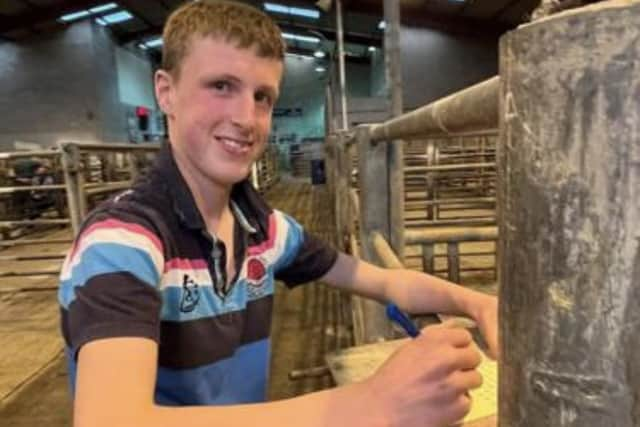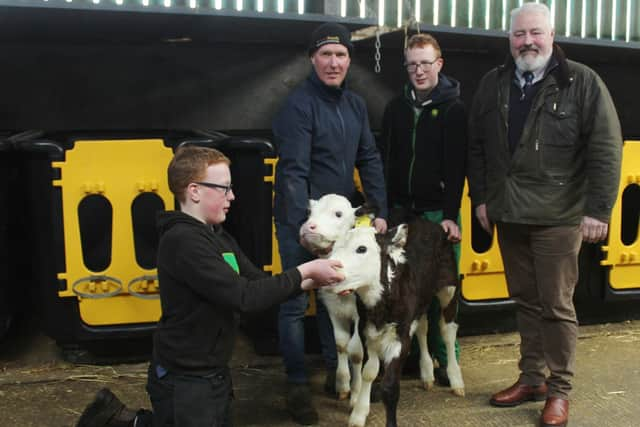Demand for Hereford-bred cattle continues to grow in Northern Ireland
and live on Freeview channel 276
And given the strong market prices for beef at the present time, there is every likelihood of this trend being maintained during the period ahead.
All of this is being reflected in the number of Hereford cattle going through the marts and the meat plants.
Advertisement
Advertisement
But its origins are to be found in the number of dairy and suckler farmers using pedigree Hereford bulls as an integral part of their breeding programmes


A case in point is Gordon Mitchell, who milks 80 autumn-calving Holstein/Friesian cows near Banbridge in Co Down with his wife, Lynda.
Last year saw the Mitchell family winning the Ulster Grassland Society ‘Grassland Farmer of the Year’ competition.
Achieving this accolade is a direct reflection of the commitment made by Gordon and Lynda to achieve the highest level of performance across every aspect of their farm business.
Advertisement
Advertisement
The couple’s increasing use within of sexed semen within their dairying enterprise has allowed them to breed a greater number of cows to a beef bull.


Gordon explained: “We have consistently used a pedigree Hereford bull on the farm for the past fifteen years.
“And there has always been a tremendous demand for the resulting calves. Previously, we would have brought some of the calves through to heavy stores or finished them on the farm."
He added: “Hereford weanlings tick every box. Bullocks and heifers can be easily finished off grass. In addition, cross-bred heifers are in strong demand as suckler replacements. The mothers are inherently fertile, they produce top quality calves and have plenty of milk.”
Advertisement
Advertisement
Gordon and Lynda are currently using the pedigree bull – Glenside Samson - as a sweeper on their cows.
Bred by Co Armagh breeder, Raymond Pogue, he is currently producing excellent quality calves with tremendous beefing potential.
Gordon commented: “We can’t keep up with the demand for his calves. For the most part we now sell all our dropped calves privately from the farm.
“And we continue to get repeat customers, which is tremendous. Samson is very typical of the Hereford breed. He is very docile, is keen to work and has a short gestation period.
Advertisement
Advertisement
“His progeny are easily calved and are born with tremendous vigour.”
Hereford Society Council member, James Graham, was a recent visitor to the Mitchell farm.
He confirmed that Hereford cattle numbers in Northern Ireland continue to increase. This trend is reflected in the quantity of Hereford straws sold by cattle breeding businesses and the number of pedigree breeders now on the ground in the province.
“There are 160 pedigree Hereford herds registered in Northern Ireland at the present time,” he said.
Advertisement
Advertisement
“AI Hereford bulls are equal demand across both the dairy and suckler sectors.”
James Graham believes that Hereford cattle can deliver a real solution for agriculture as the industry faces up to the challenge of climate change and the need to secure higher levels of sustainability.
“One goes hand-in-hand with the other,” he explained.
According to James, the consumer-related benefits of Hereford beef and the need to drive up sustainability levels across agriculture as a whole are fundamentally related issues.
“Promoting Hereford beef in this context is a now priority for the society,” he stressed.
Advertisement
Advertisement
“Hereford cattle are renowned for the quality of the beef they produce. Not only is the Hereford renowned for its innate ability to convert grass into muscle; they also help make positive improvements to the environment and soil health. Consumers should feel empowered to eat the highest quality beef product conscious of the attributes that Herefords can bring.”
Given the current climate, which sees farmers buying feed and all other business inputs at extremely high prices, James Graham believes strongly that the conditions are right to secure further inroads for Hereford cattle within the beef sector.
“With feeds, artificial fertilisers and other rising costs, the Hereford offers the benefit of saying no to compromise,” he stressed. “You can maintain an efficient beef enterprise, not
lowering the key performance indicators, daily live weight gain and quality of carcass all while lowering costs to rear and finish.
Advertisement
Advertisement
“Hereford cattle require less feed, grazed grass and silages to reach their finishing weights.
“The Hereford schemes available from all of the meat processers in Northern Ireland are acting to encourage the greater use of pedigree Hereford sires across the dairy and suckler sectors.”
The beginning of this year saw the introduction of Northern Ireland’s new Beef Carbon Reduction Scheme.
In essence, the measure is a headage payment on finished cattle that are slaughtered on or before a certain age. The four-year scheme will see the specified age drop throughout this period.
Advertisement
Advertisement
The starting point is a 30-month target, set for in 2024, which will drop to 24-months in 2027.
In tandem with the age-target falling, the headage payment increases from £20 to £75.
Further changes to the farm support landscape in Northern Ireland kick-in next year with the introduction of a bespoke sucker cow headage payment.
However, this will be linked to the criterion that replacement heifers must be calved down at 24 months of age.
Advertisement
Advertisement
Both the new support measures have been designed to significantly reduce the carbon footprint of Northern Ireland’s beef sector. They are a direct response to a Climate Change Act that was agreed in 2021. The measure puts Northern Ireland’s livestock sectors on a path to achieve a ‘carbon net zero’ position by 2050.
Significantly, it is envisages this target can be achieved without a reduction in livestock numbers.
It is against this evolving background that James Graham foresees a very positive future for Hereford cattle.
It has been a busy start to the Herford cattle year in Northern Ireland
Advertisement
Advertisement
Northern Ireland has seen a frantic start to 2024 for those involved in pedigree Herford breeding.
First-off James Graham and David Smyth, the 2023 Herford Society president, have been returned as UK society council members for a further four-year term.
Looking ahead, Dungannon Farmers’ Mart will host the 2024 Hereford Premier Spring Show and Sale of bulls on Tuesday, 13th February.
Emma Hodge, from Berwickshire, will judge all the classes. A buyer bonus is also available on the day: any animal purchased for £3,500 or more will receive £200.
Advertisement
Advertisement
Significantly, the show and sale will be a big day in the life of Jonathan Mitchell. Gordon and Lynda’s son is a student at Greenmount College in Co Antrim. He is also a very keen eye when it comes to assessing cattle.
While attending last year’s Hereford Northern Ireland annual barbeque, he won a stock judging competition, a traditional feature of that event. As part of his prize, he will have the opportunity of shadowing Emma Hodge, as she judges the various classes at the upcoming Premier Spring Show and Sale.